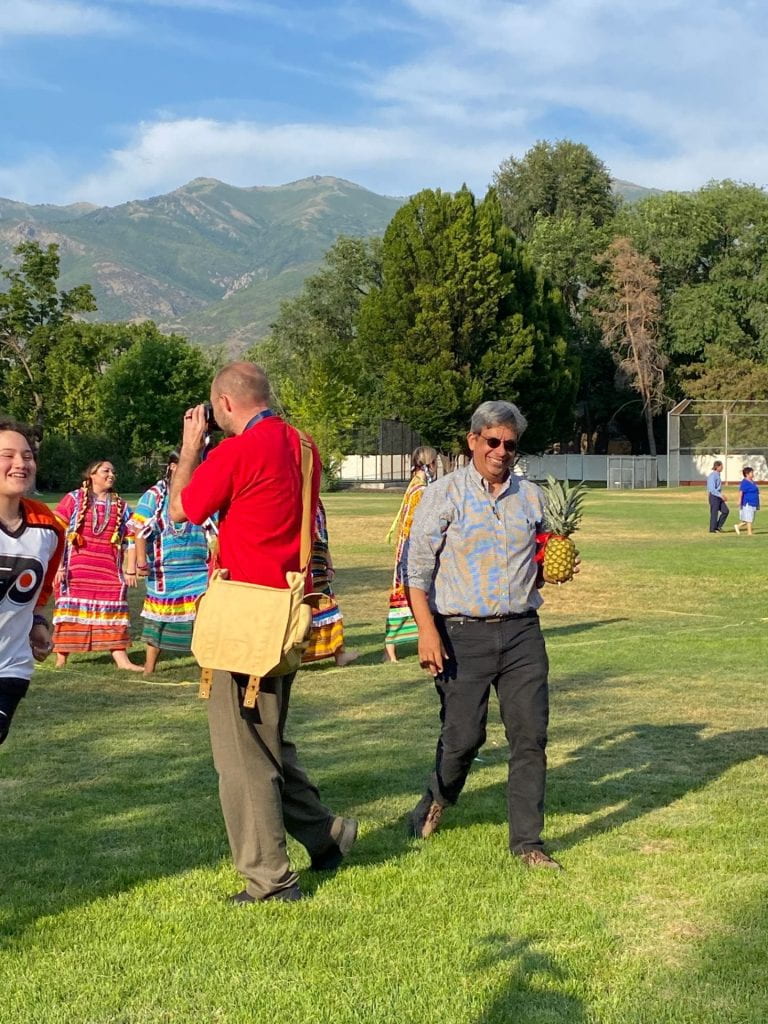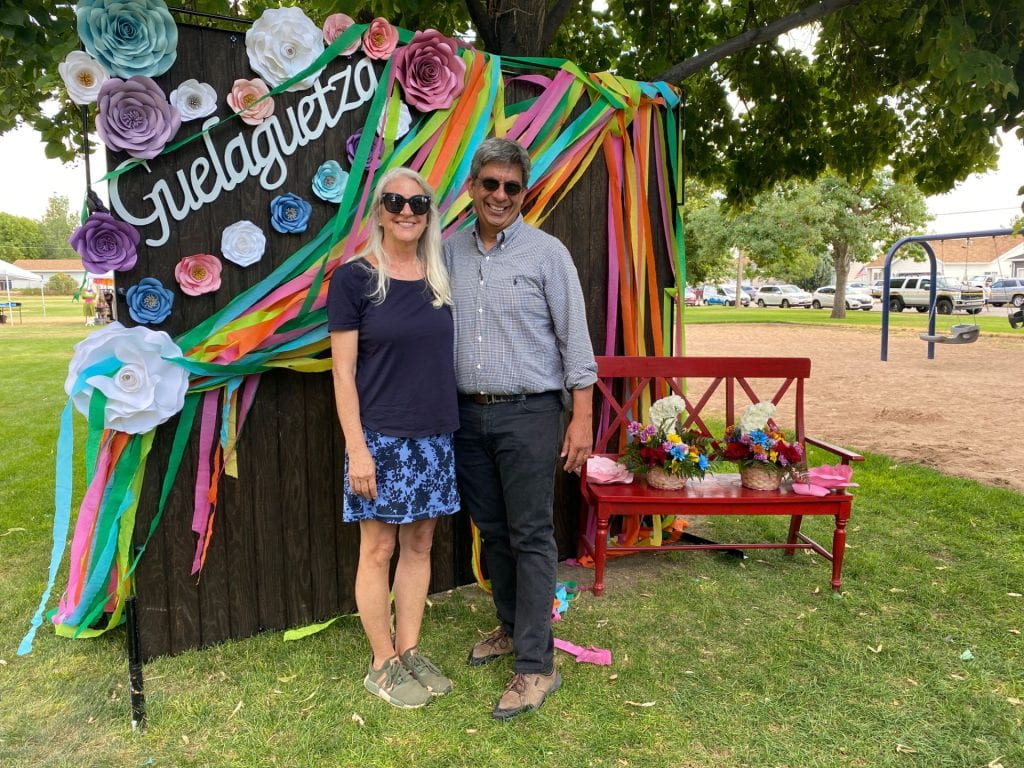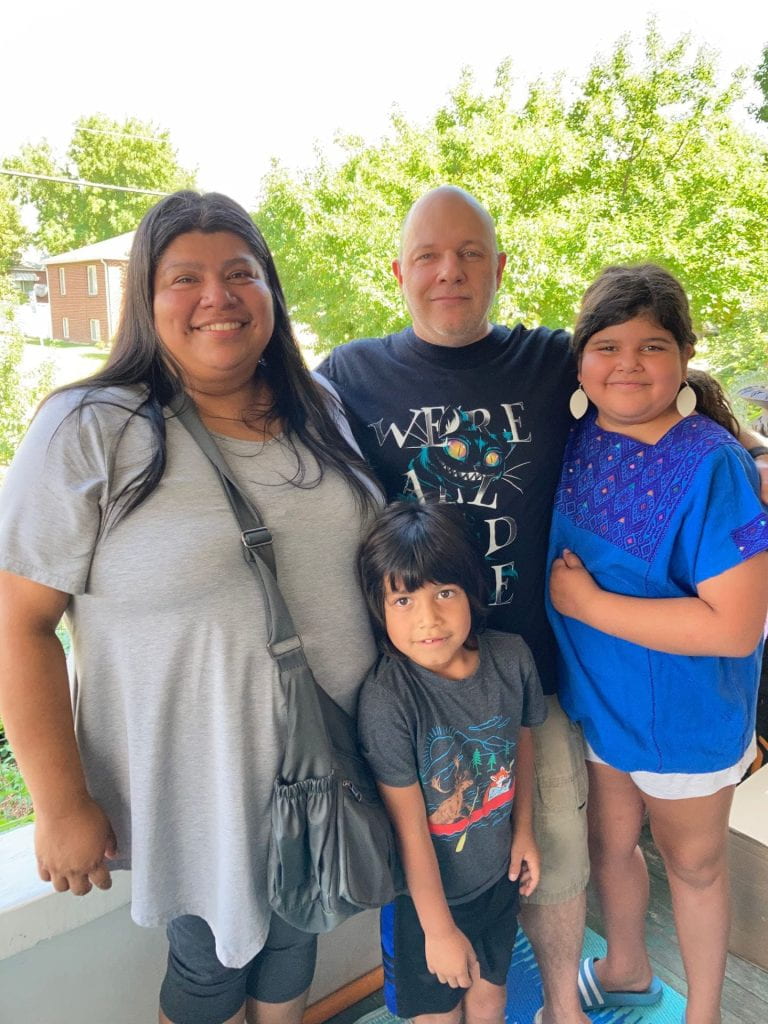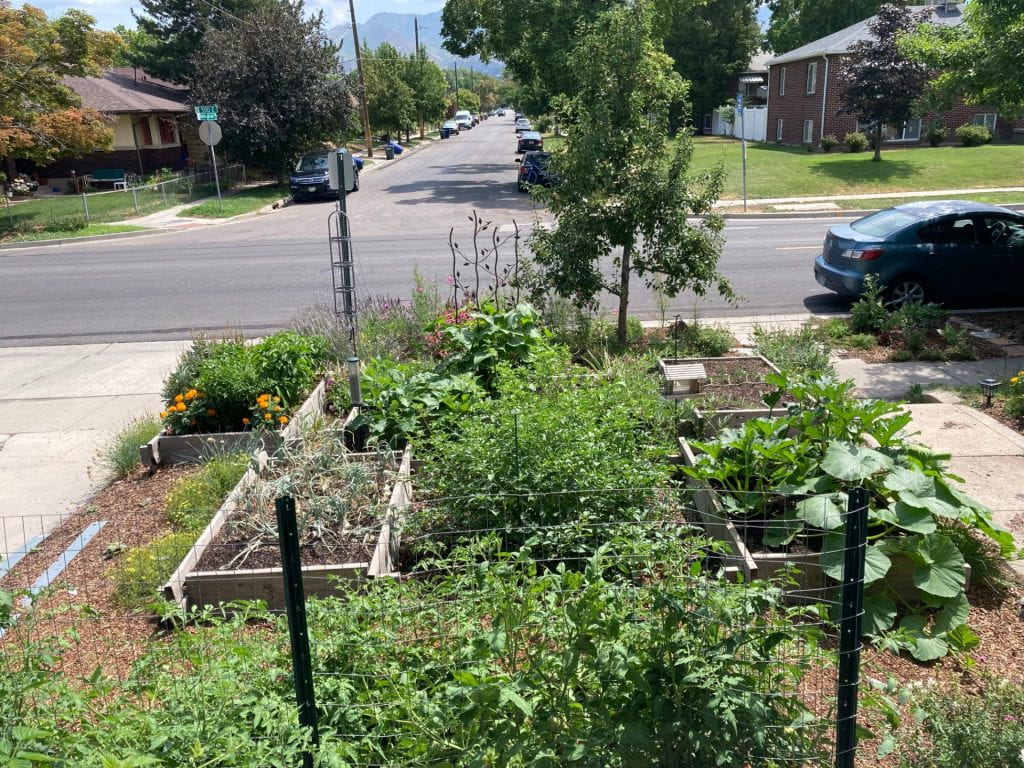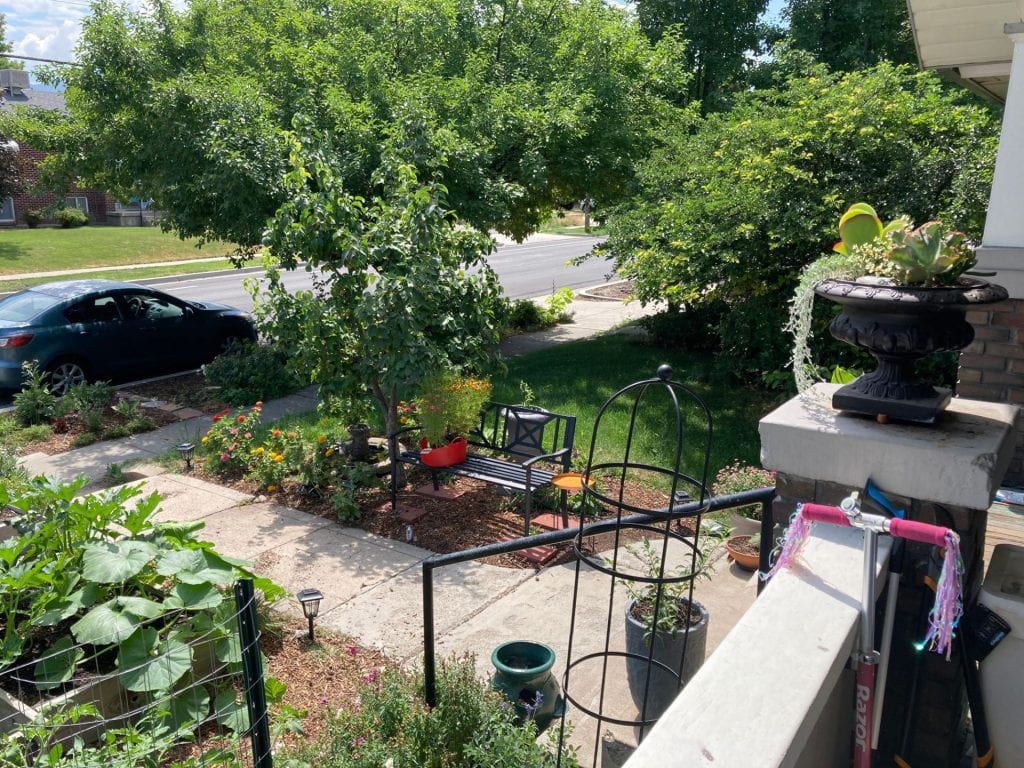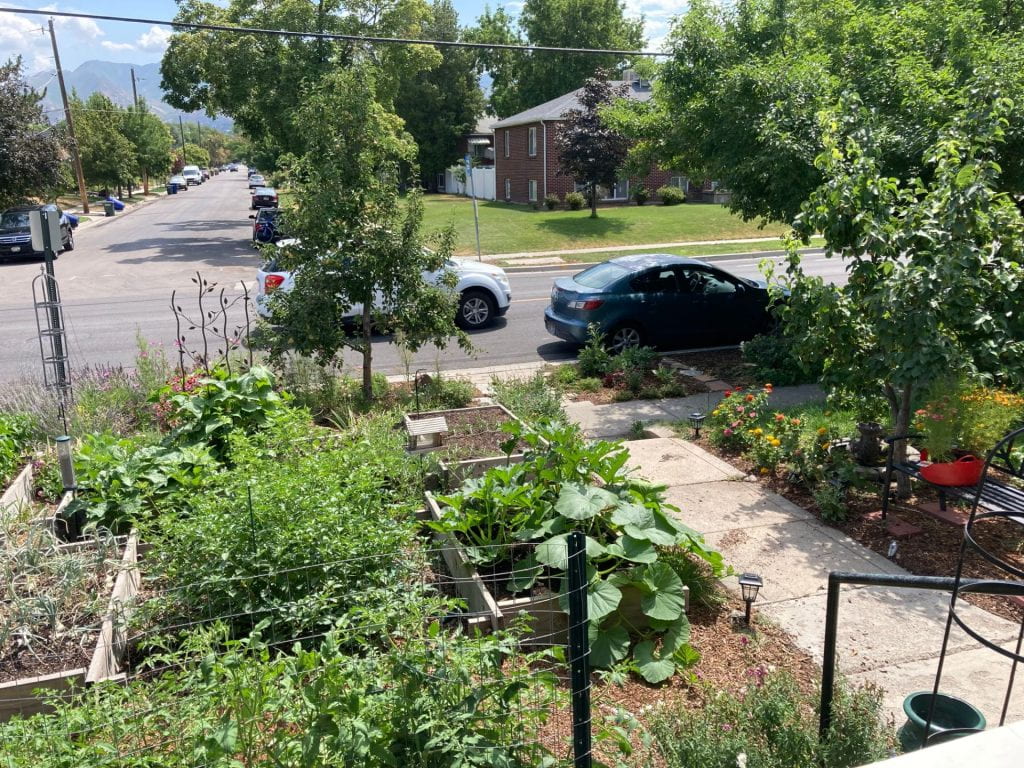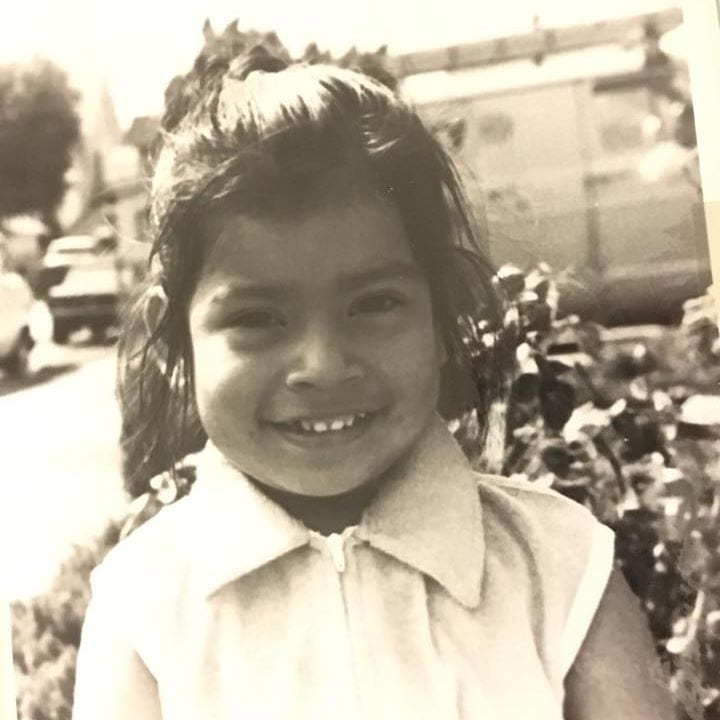We begin with Lulu’s garden and with Lulu interviewing me! “Why do you think the idea of the West persists for us, in North America? From a Mexican perspective, a child of a migrant,” Lulu says, “the other orientation was north, right? I find it so interesting that being here in the Intermountain West, being from California, the idea of the West is also in me, I feel it very much. There are other orientations, like el norte, right? Why does the West matter so much to us?”
I talk, but when I read the transcript later, I find Lulu’s “why does it matter so much to us?” falls out of my answer. On the topic of orientations, I say what is predictable perhaps about the fact that the east to west migration is cemented in imagination because it’s the victory story where majority white settlers search out and find “free land.” Anglo-American empire defeats Spanish empire while overcoming Indigenous resistance so the east to west story reigns – it’s the founding tale of America.
But why does the West matter to the “we” of the project? The question goes to the heart of things, doesn’t it? The core puzzle, not obvious to answer, and underlining what we grasp toward together by asking after relations to place and to land.
Lulu says: What I’m hearing is that by looking at feminist Wests you’re shifting the starting points. . . What happens when I hear your telling of the West, and that critique of the West, is I think to myself, well, as an Indigenous person, part of an Indigenous diaspora, who doesn’t have a starting point in the east, who has a different migration route, what do I have to say about the West?
I read out the title of something she’s just finished, as another context of our conversation. “Mestizaje desde Abajo: Zapotec Visual Cultures and Decolonial Mestizaje in the Photography of Citlali Fabián.”
Indigenous people are really savvy, Lulu is reflecting, about how to own and remake a thing so that it works for them. It’s interesting to see how we remake the bad words of settler colonialism – like mestizaje. We are sitting at a backyard table in the shade. As much as I resisted, intellectually, the concept of mestizaje, she says, I also realized that by rejecting mestizaje altogether, I don’t really get the full picture of Indigenous people. So we can remake the world that belongs to us. I’m thinking specifically about Indigenous communities but more broadly, relationality, like, how do we recreate, remake a world together that is, that has justice at its center, you know, as Daniel Heath Justice has said, in his most recent book Why Indigenous Literatures Matter. We don’t need diversity and inclusion. We need justice, kinship.
As the afternoon cools into evening, Lulu talks about her garden, Yellowstone and her mother’s love for it, the complexities of migration and mestizaje for Indigenous people, fighting feminisms, and how the West is remade by her Zapotecan communities. She says: That’s how I think about . . . really everything. If we use an Indigenous starting point, how do we tell this story? How do we challenge this other West story?
It’s a lovely long day with Ian King (Lulu’s husband), Lulu’s children Roma and Fausto, and a gathering toward evening in a big city park to which José and I are invited, a Zapotecan Guelaguetza – living out the concepts of transborder traveling communities we talk about.
The Where of Here
Krista
We have arrived into your Salt Lake City neighborhood and world through your garden – it’s beautiful! You and Ian (Lulu’s husband) built raised beds so everything spills out and is lush. And we have heard about Fausto planting sugar baby watermelon. There are so many flowers and a pear tree . . . all such key parts of relations to place, land, to history, to memory, to feminism and feminist care ethics. . .
Lulu
The garden is a conduit for me, to Indigenous memory. As you know, in my family we’re Zapotec from Yalalag, Oaxaca. Mexico. We always had something growing in the garden. Always herbs, lots of fruit trees. We’re in California, right, so lots of citrus, peaches, plums, and items brought back from Oaxaca.
Krista
We are talking about the Zapotec community in diaspora, in southern California.
Lulu
Yeah. I remember, as a child in California, in LA, you’re in a densely urban place. And yet, the backyard felt wild. We always had chickens. Everything was really tall, or at least that’s how it felt as a little kid, grass was tall. There were things to climb and chickens to chase around, and mud to make. It was the playful place. As I got older, my grandmother and I spent a lot of time in the kitchen. That is where she taught me about healing, about medicine, about memories of Yalalag – by asking me to go fetch herbs in the garden. Inevitably, I always came back with the wrong thing, right? And she would say, ok, now you know. Smell this, it smells like this. The other one, the one you’re looking for, actually has a leaf like this.
Krista
Memories of what leaf we’re talking about?
Lulu
Oh, it was always cilantro and perejil. Cilantro and parsley. As a little kid, three or four, really young – my mom went back to work at six weeks after I was born, and she quite literally handed me to my grandmother – it was a lot of running out and running back in, and is this the right thing? Is that the right thing? Checking for ripeness. My mom was also an avid gardener. It’s one of the gifts she left me. I didn’t realize how deeply it had become a part of who I am until she died. For me the garden is a site where I’ll be working on something, I’ll remember, oh yeah, my grandfather told me to do this to the chile … it is a place of healing and absolute wonder. You know when the [Mormon] missionaries come through the neighborhood, they’ll point to the garden. They’ll say, how can you not believe in God? Who do you think made all of this? And I’ll say, I did? I’m the gardener here.
Krista
Not in an individualistic way or the Protestant way of my hard work made this?
Lulu
No, no, no. I’m a part of an ecosystem. Yeah. And there is not one hand here, because that’s a narrative of God, right? This hand that’s creating this magical space, there is nothing “natural” about this garden because it’s all been worked by me. But there’s an ecosystem that I am entering into, that I would want to support.
The other thing about a garden is it is absolutely a process of hope. It is hard for me to feel hopeful with the political times being what they are, and COVID, and I live with my mom’s [recent] passing very actively. She had a very rare disease – ALS (Lou Gehrig’s Disease), rare in Latino communities. The garden is a place where I channel her because I think how she instilled in us a love of the outdoors. Her dream, her absolute dream, the whole time we were growing up was: “When I retire” . . . that was how she began every sentence. “When I retire, when I retire, I’m gonna buy an RV and go to every National Forest, National Park, in the West. Before I die I wanna go to Yellowstone.”
Krista
Her “rest area” of the future, thinking about spaces we create of security along the road, so to speak, imagining rest areas now and of the future . . .
Lulu
Yes, exactly. But she got sick, and there was no time. Nobody expects to die. I didn’t expect that she was gonna die, it caught us off guard. We all had this feeling that we’re gonna run out of time, her disease is . . . ALS is 100% fatal. If you are diagnosed, there is nothing that will slow it or change the course of it. To live with that impending death . . . . When I got tenure, I told my family I don’t want a tenure party, because everybody wanted to celebrate in the community. I said, no, all I want is to rent cars and we’re going to drive to Yellowstone. That is going to be the culmination for our family. So that’s what we did. My mother was in a wheelchair, completely immobile at that point, but we drove her to Yellowstone. And she couldn’t speak anymore.
I remember, that’s all she talked about when we were children, Yellowstone.
When I look at a garden, it is a place where I feel nothing but hope, because you plant a seed. And that seed has so much potential. And you are hoping that in a season, or in a year, or two years, it will be bountiful. We can theorize it, in fancier terms, right, because it makes me cognizant about water in the West, and our ecology – what plants do well, the movement to go back to native plants versus, you know, most of what you find at Home Depot, Lowe’s, usually native to China. It would mean honestly like 90% of the stuff that we have here is native to Asia. So that sort of return back to the coneflowers, Echinacea . . .
Krista
Plants you have in your garden . . . What else, lavender and the little orange. . . ?
Lulu
Mallow, and beardtongue. Tickseed, artichokes like the thistles, it’s part of the thistle family. What is it, uh… Just anything that’s really hardy. And there’s a whole movement here in Salt Lake to go back to native plants. And that’s important to me. When I think of the garden, I think of hope, it is a place, it is a site of absolute hope. It is a site of community because it is a magnet, for people.
Krista
There are so many bees in your garden, speaking of creaturely community.
Lulu
So many bees. There are over 200 species of bees. I love to sit there and observe and enjoy them and talk to them and thank them for visiting my garden. It gives me a sense of awe that I rarely experience anywhere else. There’s also the vegetable part of it, right? To reduce my consumerism and to have it be a grounding for my children, because you can learn about everything, soil structure, water, animals, life cycles. Fausto wanted to plant a seed and see it germinate. It becomes a learning place, a healing place. It’s my babysitter, they’re always out in the garden.
Krista
You said it was guilt free.
Lulu
It is absolutely.
Krista
I don’t know what your sources of guilt are, not to pry. But presumably guilts have to do with whatever you’re not doing you’re supposed to do . . . . Work?
Lulu
Yeah. You know my colleagues will ask me, oh, so what did you do this summer? I say I gardened. And to some ears, that feels very out of place. It feels like a waste of time. It feels too indulgent. One colleague said to me, oh, I could never spend that much time doing something that was not productive. I thought wow, how sad, we are not our productivity, that is not what is happening for me in the garden. Yes, it’s a very bountiful garden.
Gardening creates an amazing community, people who I would not have otherwise talked to, like little old white Mormon women who are walking by who also garden . . . we share recipes, what variety of this are you growing? Oh my peas aren’t doing well. A garden is a magnet of exchange, gardening is generous. Nobody plants a garden to be impoverished, they plant a garden to have too much. And so that exchange, it feeds me. One of the things that’s on my to-do list is to have a seed exchange. We have the little libraries, the little neighborhood library movement, it’s a book exchange and we have some pantries sprinkled around the neighborhood.
But we need a seed exchange. I’m going to build, at some point this summer, a seed library, because gardening expenses or money should not be the thing that keeps you from gardening. Seeds are expensive, they’re precious. They’re thought of as a luxury. If someone can grow a little patch of lettuce, or radishes or some peas, that’s the kind of community that I want to create, a little spot for extra vegetables that I’m not going to eat from the garden, and then a couple of flower seeds. Let the momentum of that take over and bring people from the neighborhood. I live in a great neighborhood. Everybody is very interconnected. Yeah. If I can talk to you about gardening, I can, I can talk about it forever.
Krista
The question about the garden is a question about place, and how many places travel through the garden for you. Places in Oaxaca, in southern California, the place of here, memory, futurities. Would you think aloud with us about whatever you would call your feminisms? We are asking everyone to send a visual that represents to them “feminist Wests,” and you sent a picture of you that your mother took. José and I love it, we noticed it’s on your profile picture on Facebook. How do you think about feminist wests or your own feminism or Indigenous feminisms? What image comes to mind for you? A lot of times people have to wade through a lot of images that they don’t think respond to how they understand feminism.
Lulu
When I think about feminism, I think about a fighting feminism. I didn’t realize this until we were sitting at the kitchen table a little bit ago, that story I was telling about Mormon missionaries coming to the front door, to evangelize Roma and Fausto! I told them no! You can’t come up to our door. Leave. (Laughs.) My daughter loves it when I stand up for her, or when I stand up to things, she loves those kinds of stories.
Krista
Yeah, she wanted you to tell that story for a half an hour, she waited patiently sitting here to have you tell that story.
Lulu
Yeah. On the one hand, the story is about Mom making her feel safe about people coming to the front door. But also, for me, I always remind myself that I am raising an Indigenous woman, I think very purposefully. What can I leave to her that will help her be an Indigenous woman now? What do I teach her that will serve her in 10, 15 years? I learned a lot from the women in my community. When I think of feminism, I think about those women who quite literally fought. In my community, there’s a practice of arranged marriages. Everyone before my parents’ generation had an arranged marriage, and they would perform arranged –
Krista
In southern California, it traveled?
Lulu
No, in Yalalag. You would readily recognize these as arranged marriages, parents negotiate a dowry, and suitors. There’s a protocol about which families are good families to marry into.
And the age of the girl. The girl will have veto power, she can say no. But she has to be open to meeting suitors. And the expectation is that she will eventually say yes.
So my grandmother was married at 14. My grandfather was 28. That was typical. My grandmothers on both my parents’ sides had a marriage like that, at 14 and 15 with a much older man who could provide. Was he a good farmer? Did he have a good harvest? Did the family hold on to ancestral lands? There was always migration, in and out of Yalalag. As you know my family were leaders, and we have our ancestral lands in Yalalag, we have a home, and land. Land is important.
My grandmother on my dad’s side had 10 children. Seven died, three lived. My grandmother on my mom’s side had 9. One died. Growing up, my grandmother, because I spent so much time with her, had a lot to say about arranged marriages, about childbirth.
Krista
Would you want to give examples?
Lulu
So, okay, so this is totally women’s talk, right? In part, it’s graphic. But when I think of feminism, my grandmother was arming me with information always. It was information meant to protect me, bodily, physically. And to be aware. If I were to use recognizable terms to us, she was arming me to be aware of how patriarchy functioned. And to figure out ways to get around it. What fascinates me about my grandmother-
Krista
What is her name?
Lulu
Elvira Montellano She was married at 14, she had her first baby at 15. My grandfather’s 28. And from that point to the time that she died, she became the matriarch of the family. It was her counsel that everyone came to find, it was her permission, her blessing. When people were newly arrived in LA, they came to see her, to bring gifts. So I was always curious. She was a tough, tough lady. And I wonder, how do you get from 14 and married, married off, to matriarch at 73?
Krista
Yes, how?!
Lulu
It’s funny because I was sitting in on a book proposal workshop of an Indigenous scholar, and she brings a feminist lens to her work. And she said, in passing: This feminism feels so foreign. It feels like I’m imposing something. And then I thought, no! We have a fighting feminism, right? Part of how my grandmother transformed things is she quite literally, physically fought. I was telling my friend that there are two stories where my grandmother held a knife to someone’s throat, at 16, in order to own her place in the house. It was the moment where she took over as the mother in the house. My grandfather’s sisters were also living in the house. And there was always conflict because they had been the women of the house. And now she, as the married woman, was saying she should occupy that status, as the head of household.
Those moments are the kind of feminism that I have inherited, that I was brought into, a fighting feminism. It’s funny, I never put two and two together that Roma loves the fighting feminism. I tell her, even if you’re afraid you have to stand up. I’m thinking about the vulnerabilities of children, their bodies, both of Roma and Fausto’s bodies. I’m constantly reiterating that you have to get mad, if you’re scared, get mad, you can yell. It’s so funny, because thinking now, that’s exactly what my grandmother used to say. She wanted to forewarn me, because she would say, on the night that you get married, something is going to happen to you. Right? And I’m just thinking now, her as a 14 year-old girl, can you imagine? Something is going to happen.
Krista
I can, unfortunately.
Lulu
I’m paraphrasing, but she was implying, or what I took away from it was, if you can survive that, you can survive anything.
Krista
She was unprepared by her own mother?
Lulu
Oh, yeah. Oh, yeah. Yeah.
Krista
I have questions about the imposition of “feminism” and whether there a time for you in which that term or that whole language/discourse can be utilized so that it isn’t “the imposition?” Because I think what you’re describing in Yalalag is, you called it, in conventional terms, “patriarchal.” How otherwise would you understand it? You quote María Lugones in the essay cited above. She talks about the historical imposition of colonial gender norms onto Indigenous communities. I don’t know how you understand what was happening in Yalalag? Then they get transferred intergenerationally … in diaspora? And also does a memory of those gender problems from to the gendered social order, move?
Lulu
I think “the patriarchy” is too limiting. It doesn’t capture the exchanges between the two genders in Yalalag, and the places that women occupy that could be seen as feminist.
Also, women themselves would never use those terms to describe their kinship structures. They would not describe them as “natural.” My grandmother used to talk about duties.
Krista
Comunalidad. We were talking before on this topic.
Lulu
Yeah, comunalidad, and the “techio.” The other duties that they participate in, offering resources. These are really impoverished communities, right? My grandparents grew up with no shoes. My parents grew up with no shoes. They didn’t get electricity until the 1950s, maybe early 1960s. They don’t have running water, right? These are super subsistence communities even though they participate in global commercial trade at the same time.
Krista
Things for sale you mean?
Lulu
Import/export, yeah. But techio is about sharing resources. Within that structure, different groups of people have different roles, and they are gendered, not exclusively, but you will never see a man making tortillas, that would be offensive.
Techio is the service structure of Indigenous pueblos. Every male in the family has to give two years of service to the pueblo. That’s civil service. Building roads, digging wells, digging ditches if there’s a mudslide, giving sort of a night watch service. Service is the thing that makes you belong to the pueblo, in addition to bloodlines, and genealogy, this is how you maintain your status in the pueblo.
In diaspora, we don’t have that. In the early years of immigration, people would go back to Yalalag to do their techio, and then return to the US. I remember my grandmother talking about it, saying, that person is back home for a year or two years, or they sent their son, or they’re having their cousin do it for them because they can’t cross the border. But in the US, techio is transformed. One, there is no homeland to do that techio in. So how does that affect comunalidad? Because comunalidad is that exchange, that thing that bonds all of us, and that’s tied very specifically to land. But if you take that land element out of it, then what is the thing that bonds us?
One of my good friends, Brenda Nicolas, is working on a concept called transborder comunalidad. She is working with Lynn Stephen’s ethnographic work on transborder identities. Stephens has worked with Oaxacan Indigenous communities, and she talks about the sort of transformations of Indigenous identity that happen when you cross the border.
As I have been saying, in my work, the border is just stop three, or stop four, right? “The border” is not where Indigenous transformation begins.
Really, the departure changes your sense of existing in the world and reconfigures your Indigeneity. It happens in very documented ways at the US/Mexico border. But it also happens in Oaxaca City, in Mexico City, it happens in Tijuana, it happens in LA, for those of us who never crossed the border, right.
Krista
What do you mean, who never crossed the border?
Lulu
Like me, I was born in the US, so I never crossed the border.
I’ve been working with the concept of comunalidad viajera which de-emphasizes the border, I first heard the term from a community organizer. That process of travel speaks to me because I think of myself as an academic migrant. You know, as a first gen. college student, first gen. PhD student, first gen. faculty member, first gen. tenured faculty member, right? I always feel I’m coming up against a world not made for me. I’m always aching for California. I’m always longing to be in my community. I’m always longing to hear the music, to hear Zapoteco spoken.
When I moved to Texas for graduate school at Rice, my mom was really upset. I can’t believe you’re leaving, she said, she was upset that I was going to be gone. You’re never going to come back, she said. She knew. Yeah.
Krista
And you say, Oh, I will, I will, I will, but all along it’s not happening.
Lulu
Yeah, I promise. Of course I’m coming back, everybody returns. But they don’t, right? This is what we know about the migrant experience. They make home somewhere else.
Krista
[Long pause.]. Can we return to the conversation about feminism in your essay about the photographer? The “Desde Abajo” essay (linked above) on decolonial mestizaje.
You talk in the piece about the method, the wet plate processing, that allows her to speak back to a colonial archive, to locate Indigenous presence in the archive. In your view it’s a way to create Indigenous presence going forward, to make a future, and a vision of a futurity. You wind that around to a discussion about the ways, in her photographs and the community that’s created in the photographs, that those moments become the decolonial moments. And it’s a feminist decolonial. Mixed in there is the deep relations the photographer has with other people which can avoid or disqualify a settler gaze. I wondered if you would think about the feminist imaginary of the piece? Your idea is that through this process of taking these photographs, she creates communities outside of ones that exist, communities for people in diaspora like yourself.
Lulu
I like the term feminism because it forces ties that might not otherwise be present. And for me, that’s really important because of the sort of context that Indigenous people occupy, which is, we’re always invisible, right? And for me, in particular, in my community, because we are migrants from Mexico. And we are racialized as border crossers, as Mexican-American, and the Indigeneity always falls out.
So it’s against that invisibility that feminism is. … I don’t think of them as separate things. I feel like the labor of women, the culture-making of women, the political activism of women, is what actually makes our Indigenous communities visible. In the US a lot of the labor that has been done to advance comunalidad here, the fundraising that happens to send money back to Yalalag to pay for workers who can do the infrastructure work that would otherwise be done by the men there, it’s the women who do that organizing. It’s the women who are producing all of that connective tissue. For me, while the communities themselves might not use “feminism” – meaning the older generation, the 1970s generations, my parents’ generation, the younger generations are absolutely using those terms.
They’re going through the school system, right, and they’re taking our classes. They’re also women of color in the US going through the #MeToo movement, going through racial uprisings and awakenings, much like I did through the Rodney King racial uprisings in 1992. We’re very American, our politics are, I won’t say Americanized, but we’re being racialized, we’re coming into our awakening through the racial politics. There is a possibility to imagine things that, in the past, might not have felt like they belonged to us, to find new languages and new practices so that we can own them. Because though I’m not comfortable with the term mestizaje, I would never identify as a mestiza, I find something moving about Citlali’s work and her usage of mestizaje.
Krista
And when she misuses it, that’s when it becomes used on behalf of Indigenous worldmaking.
Lulu
Yeah, yes. I guess that captures ways we can misuse feminism, have a fighting feminism, so that we do open up a space of possibility.
Oh, man, this is really fueling my own thinking.
Because it usually just exists up here. And I never say it out loud, you know?
I’m busy with kids. [laughs] It’s just when I’m gardening, that’s when I’m thinking about all this stuff. And I think, okay, when I have some time, I’ll write notes. And I’ll write that article.
Krista
Now you have notes, you have the notes to do so. Last thoughts?
Lulu
Thank you for that. Oh my gosh, this is so awesome.
